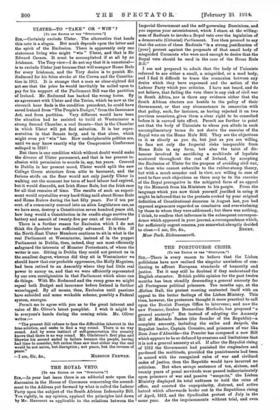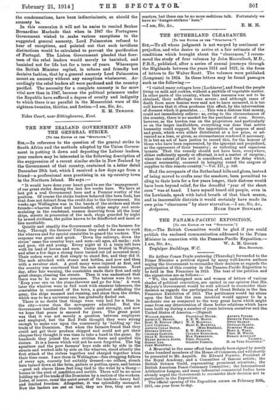THE PORTUGUESE CRISIS.
(To TIM EDITOR Ol THE ..BP.C1,708.1 SIR,—There is every reason to believe that the Lisbon politicians have now realised the singular unwisdom of con- tinuing to affront European standards of humanity and justice. Yet it may still be doubted if they understand the English character. British public opinion for the past twelve months has been steadily demanding a general amnesty for all Portuguese political prisoners. Ten months ago, at the /Eolian Ball, the protest meeting contented itself with an appeal to the better feelings of the Lisbon Ministry. This time, however, the protesters thought it more practical to call upon the British Foreign Office to intervene ; and now the new Premier, Senhor Bernardino Machado, has proposed "a general amnesty." But instead of adopting the Amnesty Bill of Machado Santos (the founder of the Republic)-.-a, complete amnesty, including the exiles and emigres, the Royalist leader, Captain Couoeiro, and prisoners of war like Dom Joao d'Almeida—the Premier has composed a new Bill which appears to be so defaced by evasions and limitations that it is nuts general amnesty at all. If after the Royalist rising of 1912 the Government had punished the ringleaders and pardoned the multitude, provided the punishments had been in accord with the recognized rules of war and civilized codes of justice, then the Republic would have incurred no criticism. But when savage sentences of ten, sixteen, and twenty years of penal servitude were passed indiscriminately upon prisoners of war and passive "suspezts," the Lisbon Ministry displayed its total unfitness to hold the reins of office, and courted the unpopularity, distrust, and active hatred which afterwards broke out in the Republican rising of April, 1913, and the Syndicalist protest of July in the same year. As the imprisonments without trial, and even
the condemnations, have been indiscriminate, so should the amnesty be.
In this connexion it will not be amiss to remind Senhor Bernardino Machado that when in 1847 the Portuguese Government wished to .make various exceptions to the suggested general amnesty, Lord Palmerston refused to hear of exceptions, and pointed out that such invidious distinctions would be calculated to prevent the pacification of Portugal. The Lisbon Government pleaded that four- teen of the rebel leaders would merely be banished, and banished not for life but for a term of years. Whereupon the British Minister replied, in urbane and friendly but decisive fashion, that by a general amnesty Lord Palmerston meant an amnesty without any exceptions whatsoever. . Ac- cordingly the rebel leaders all were pardoned and the country pacified. The necessity for a complete amnesty is far more vital now than in 1847, because the political prisoners under the Republic have suffered a degree of cruelty and indignity to which there is no parallel in the Monarchist wars of the eighteen-twenties, thirties, and forties.—I am, Sir, de.,















































 Previous page
Previous page